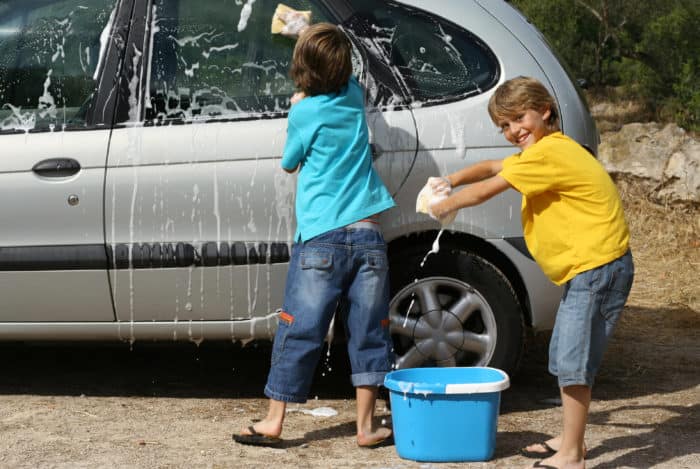Why Your Kids Should Do Chores
This post contains affiliate links. If you click & make a purchase, I receive a commission! Thanks! Read my full disclosure policy. As an Amazon Associate, I earn from qualifying purchases.
Do you wonder why your kids should do chores? Or even if they should do chores? There are loving parents on both sides of that question. However, it does seem that our culture is leaning towards kids not doing chores.
But for Christian parents, the answer should be informed by biblical principles of parenting. One of those principles is that is that you are not raising children, you are raising adults. When you take the long view, that your children will one day need to be independent and responsible adults, the advantages of having your children do chores become clearer.

A closer look at the reasons why your kids should do chores may encourage you to go against the trend of raising children who expect to be served instead of to serve.
8 Reasons Why Your Kids Should Do Chores
Doing chores teaches responsibility & respect for the effort of others
You know that running a home takes a lot of effort and time. But your children might not realize how much effort and time. When they are expected to help by doing chores on a regular basis, they begin to understand. Eventually, they’ll even appreciate your hard work – just don’t hold your breath!
In addition to learning to appreciate the work that others do, doing chores will teach them to be responsible for doing part of that work. Once they start seeing how much work running a home takes, which is a process that continues for years, they need to begin doing some of the work.
For example, when your son has a soccer game and his uniform is dirty because he didn’t do his laundry, like he is supposed to, he’ll learn to be more responsible. And when your daughter can’t go to a birthday party because she didn’t do the dishes last night and now has to do them today, she’ll learn also.
It’s tough – but so is life. Making sure your children learn some responsibility early in life will make their lives easier in the long run. But it’ll also make yours a bit tougher in the short term.
Doing chores regularly builds a strong work ethic

When our sons were teenagers, we used to tell them that if they learned to show up on time to a job and work hard, they’ll never have be without a job. As husbands and fathers now, they have both worked a wide variety of jobs and are highly valued by their employers.
I’m not bragging. I’m just pointing out that having the character to work hard is a dying trait in society. When you teach your children to work diligently, they’ll stand out in the crowd as being someone who brings worth to their employer. More often than not, this will also result in earning higher wages.
For those children who want to own their own business one day, a strong work ethic is indispensable for success.
Doing chores teaches your children to serve others
The Bible repeatedly teaches that believers are expected to serve others, just as “the Son of Man came not to be served but to serve” (Mk. 10:45). Christian parents should model this characteristic as well as teach it. One of the best ways to teach service is by requiring it.
Learning to be responsible in doing assigned chores, which is a way to require serving, will help instill this value in your kids. Doing chores is only one step in the process of teaching this valuable characteristic. But it is a great place to start.
Eventually, you’ll want to add other service opportunities at your church, other ministries, mission trips, and so on. By then, the idea will be clear in their minds even if they haven’t quite matured into believing it completely yet.
Doing chores instills the value of teamwork

Everywhere your children turn they will find people who do only what is best for them. They will meet many individuals whose goal in life is to get ahead at any cost. People who contribute to a group or business only because it also helps them as individuals.
God didn’t create humanity to be that way. He created us to thrive in community with others. To help, encourage, support, and learn from others. To be an integral part of a team.
But you need to teach your children that truth because they won’t learn it from their culture. When kids are required to do chores for the good of the family, they learn that their personal needs and wants sometimes must take a backseat to the needs or desires of the community – in this case, the family.
Generally, those who contribute to a team or community also benefit. But your children need to learn that contributing to the group is valuable even if there isn’t a personal benefit.
For example, your son benefits from doing the laundry by having clean clothes. But it is also a good idea to have him help paint his sister’s bedroom – even though there is no personal benefit to him. It’s a valuable lesson to learn.
Doing chores teaches life skills
This should be obvious, but just to make the point clear, here’s a short list of some life skills your children need to master before becoming adults:

- Cooking
- Doing laundry
- Scrubbing toilets
- Mowing the lawn
- Taking out the trash
- Caring for pets
- Putting away belongings
- Sweeping, mopping, and vacuuming
- Cleaning windows
- Washing the car
- Dusting
- Loading a dishwasher
- Hand washing dishes
- Setting the table
- Putting away food after a meal
Every one of the items on this list could be a chore. And since your children weren’t born knowing how to do any of these things, you’ll need to teach the skill before it becomes a regular chore.
Teaching life skills through chores means that you’ll have confidence your son won’t survive on cold cereal (all the time) and your daughter can fix a constantly running toilet. It means you’ll have confidence in their ability to survive on their own!
Doing chores instill confidence
Closely related to learning life skills, as your children master various tasks their confidence in their own competence will grow. The look of pride on your teenager’s face when she prepares a complete dinner all on her own for the first time – a feat that takes years of training to accomplish – is priceless.
Your children will face many difficult moments in their lives. Everyone does. When you give them the gift of confidence by allowing them to learn, fail, and try again until they succeed, you are setting them up to face those difficulties with courage and a strong belief in their ability to learn, adapt, and meet the challenge.
Of course, this needs to be balanced with trusting the Lord, but the two are not mutually exclusive. Often, the more someone trusts the Lord, the greater confidence he has in his ability to overcome whatever he’s facing.
Doing chores encourages independence and self-reliance.
What sweet freedom it is when your children learn to make their own sandwiches and snacks! You’re freed from the never-ending requests for food and they learn to meet their own needs (within limits, of course).
The same can be said of any chore. When your daughter learns to do laundry, she is no longer dependent on your ability to get her favorite outfit washed in a timely manner.
When your son learns to buy birthday presents online (with a preloaded debit card and low dollar limit!), he no longer has to wait for you to be free to take him shopping. Bonus when he learns to wrap the present!
The same could be said about changing sheets, vacuuming their bedrooms, or hanging pictures. Once your kids know how to do something, and do it well, you are freed from a small piece of responsibility and they learn to take care of small matters on their own.
Doing chores helps your kids learn to manage their time, focus, and energy
Maybe you’ve heard this phrase, “If you want something done, ask a busy person.”
It’s true because busy people have learned how to manage their time, focus, and energy effectively so they can get everything done. This essential life skill is one that too many people never learn.
You can give your children a priceless and rare gift by helping them develop this skill. Don’t worry that they struggle to manage it all. As every busy person knows, this is a skill that continues to be improved throughout life.
The two most important related lessons to teach your kids are that (1) this is a skill that can be learned, not a natural ability you either have or don’t and (2) you expect them to begin learning the skill and applying it, even though they will struggle. One day they will (probably) appreciate the wisdom of these lessons!
What chores at what ages?
Obviously, your son should have different chores at age 10 than at age 4. But determining what those chores should be depends on a few factors. Some suggested chores for different age ranges are listed below. But before simply following a list, think through a few questions about your child.
4 questions to ask yourself before assigning chores
First, you need to consider what your child already knows how to do. Maybe the answer is “nothing.” If that’s the case, you start small. But if she’s 12 and knows quite a bit, the decision about chores is a bit more complicated.
Second, you need to consider what your child’s maturity level is. This covers emotional, mental, and physical maturity. So, for example, the list below says a preschooler should be able to match clean socks. But if your child is color-blind, that might not be a great chore for him. Or if your child is developmentally delayed, then chores listed for ages 6-9 year-olds might not be assigned until age 12 or older.
Third, consider how much time you have left. If your son is turning 16 next week, you might want to prioritize his chores based on the life skills you want him to master before graduating from high school.
Finally, consider her character. If she has an attitude of disrespect and defiance, maybe cleaning the toilets would be an appropriate chore to add. Or maybe working in a food pantry for a child whose sense of entitlement is out of control.
Sample chores by age
Please remember two things: (1) these are guidelines or suggestions only and (2) each age range automatically includes all previous chores.
Ages 2-3
- Put away toys
- Put dirty clothes in the hamper
- Get diapers & wipes
- Dust baseboards
- Sweep with a hand broom
- Fold washcloths & dishtowels
- Sort laundry by color
- Help load dishwasher
- Stack books on shelves
- Put trash in the garbage and recycling bins
- Wipe up spills
- Arrange stuffed animals on the bed
Ages 4-5
- Help set the table
- Put away some laundry such as socks
- Fold small towels
- Make their bed
- Make simple snacks
- Use handheld vacuum
- Clear kitchen table
- Wipe down doorknobs
- Feed pets
- Unload silverware & cups
- Water plants
- Match clean socks
- Rake leaves
- Dust furniture
- Bring belongings in from the car
- Replace toilet paper rolls
Ages 6-9
- Fold towels and other easy-to-fold laundry
- Put away their own laundry
- Put piles of laundry on each person’s bed to be put away
- Help fix meals, with supervision
- Mop floor
- Weed garden
- Rake leaves
- Make simple food (like PB&J)
- Put away items & organize an area
- Wipe off table & countertops
- Clean toilet
- Clean mirrors
- Sweep porch
- Wash laundry
- Walk dogs
- Bring an empty garbage can from the curb
- Put groceries away
- Wipe sink & vanity
- Fold laundry
- Help weed the garden
- Wash dishes
- Unpack backpack and lunch box
- Clean the microwave oven
- Sweep floors
- Get the mail
- Pour breakfast cereal and make toast
- Load and unload the dishwasher
- Bake cookies, with supervision
- Clean up after pets
- Vacuum
Ages 10-12
- Clean the entire bathroom including the toilet and shower/tub
- Clean kitchen
- Prepare simple meals without assistance
- Prepare simple meals
- Mow lawn
- Peel vegetables
- Prepare salads
- Sweep out garage
- Take garbage to the curb
- Vacuum carpeted stairs (with hand vacuum) (link to hand vac)
- Sweep hard flooring steps
- Use the washer and dryer appropriately
Ages 13 -18
- Wash car
- Clean inside of the car
- Trim hedges
- Paint walls
- Help grocery shop
- Cook complete dinner
- Bake cookies
- Wash windows
- Iron clothes
- Babysit siblings
- Help with simple home repairs
- Clean out the fridge
- Plan and prepare a week’s worth of meals
- Do simple mending such as buttons and fixing small tears
- Replacing light bulbs
- Replacing furnace filter
- Making grocery list
- Empty the vacuum or replace the bag
- Use power tools with supervision, such as a drill or circular saw
Now What?
Now you have a decision to make: will doing chores be a regularly expected part of your child’s life? And if the answer to that is yes, then you need to decide what chore(s) you’ll start your child doing this week. You know what they say: “There’s no time like the present.”






